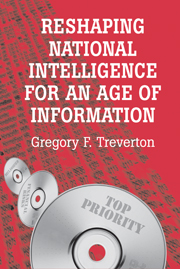Book contents
- Frontmatter
- Contents
- Foreword
- Preface
- Note on sources
- 1 The imperative of reshaping
- 2 The world of intelligence beyond 2010
- 3 The militarization of intelligence
- 4 Designated readers: the open source revolution
- 5 Spying, looking, and catching criminals
- 6 The intelligence of policy
- 7 A reshaped intelligence
- Index
7 - A reshaped intelligence
Published online by Cambridge University Press: 23 May 2010
- Frontmatter
- Contents
- Foreword
- Preface
- Note on sources
- 1 The imperative of reshaping
- 2 The world of intelligence beyond 2010
- 3 The militarization of intelligence
- 4 Designated readers: the open source revolution
- 5 Spying, looking, and catching criminals
- 6 The intelligence of policy
- 7 A reshaped intelligence
- Index
Summary
Suppose the international environment remained a relatively benign one for the United States over the next decade-plus, the period between now and 2015. That doesn't seem a bad bet. No military peer of the United States will emerge, though the shadow of a future such possibility might conceivably fall over the latter years of that decade. The major alternatives to a benign world for intelligence are two, each with very different implications for intelligence. The first would be a series of terrorist attacks on the United States with biological weapons or other weapons of mass destruction. The damage from those attacks could be truly fearsome; even if it were not, the attacks would be likely to frighten Americans well beyond the real damage.
That world of direct threat would push intelligence back in a Cold War direction: National purposes would become paramount, and secrets would loom larger, as would what the government itself collected. Cooperating with foreigners in fighting terrorism would probably be just as necessary in that world as it is now, but actually accomplishing the cooperation would be harder. In a climate dominated by national purposes, intelligence would be seen as a way to get a leg up on others. And if the military seemed frustratingly awkward to bring to bear against terrorists, and so lost favor in Washington's budget wars, intelligence would still be regarded as invaluable. Its budgets could rise as the military's fell.
- Type
- Chapter
- Information
- Reshaping National Intelligence for an Age of Information , pp. 216 - 256Publisher: Cambridge University PressPrint publication year: 2001

